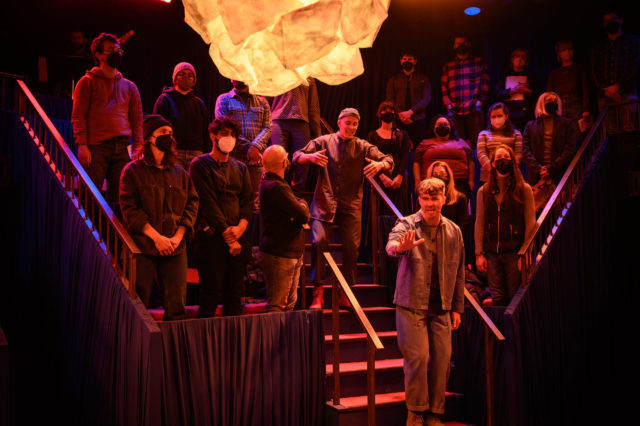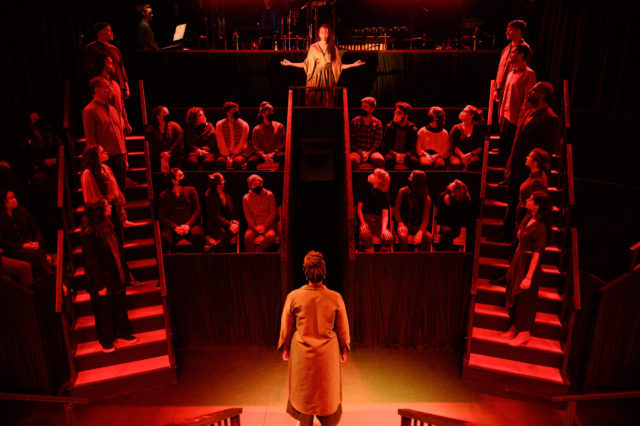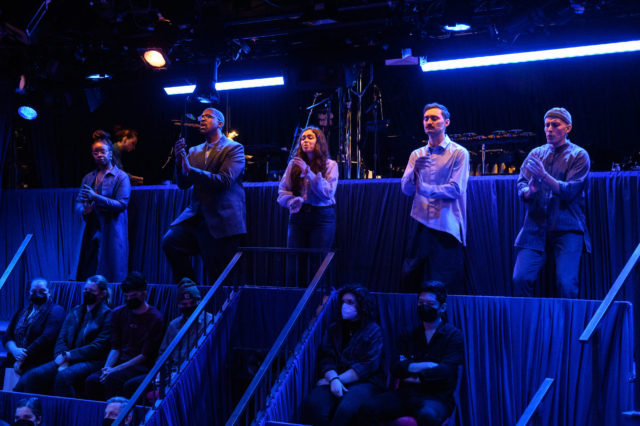
Heather Christian’s Oratorio for Living Things is an exhilarating journey through time, space, and shared human experience (photo by Ben Arons)
HEATHER CHRISTIAN’S ORATORIO FOR LIVING THINGS
Ars Nova at Greenwich House
27 Barrow St. at Seventh Ave. South
Tuesday – Sunday through May 15, $35-$65
arsnovanyc.com/oratorio
Heather Christian’s Oratorio for Living Things is a gloriously exhilarating ninety-minute celebration of life, art, and nature, an immersive journey through the complex quantum, human, and cosmic time and space of our daily existence.
Oratorio is Obie winner Christian’s follow-up to Animal Wisdom, a confessional of music and storytelling dealing with the personal and communal aspects of ritual and superstition, grief and loss, ghosts and the fear of death, and I Am Sending You the Sacred Face, a solo virtual musical about Mother Teresa, performed in drag in a closet by Theater in Quarantine’s Joshua William Gelb.
The Ars Nova production takes place in a reconfigured, in-the-round Greenwich House, where the audience sits in a few steeped rows of rafters, each section separated by a dozen steps; it’s such a small group that you feel specially privileged to be there. Twelve lovely performers (Sean Donovan, Carla Duren, Ashley Pérez Flanagan, Brian Flores, Quentin Oliver Lee, Angel Lozada, Barrie Lobo McLain, Ben Moss, Onyie Nwachukwu, Dito Van Reigersberg, Kirstyn Cae Ballard, and Divya Maus) in casual, carefully considered dress move up and down the stairs and through the tiny center stage area, over which dangles a glowing orb that evokes an unstructured, abstract globe or meteor. At the top of either side is the outstanding band: Johnny Butler on woodwinds, Jane Cardona on piano, Clérida Eltimé on cello, Odetta Hartman on violin, John Murchison on upright and electric bass, and Peter Wise on percussion.

Greenwich House has been transformed into a unique communal space for Oratorio for Living Things (photo by Ben Arons)
Throughout, the singers make warm, intimate direct eye contact with the audience, signaling we are all on this planet together and need to live in unison with one another and nature. Christian’s libretto, which is handed out to each audience member as they’re seated, is in English and Latin; the lights are usually dimmed just enough to still allow you to follow along, but you certainly don’t have to.
As Christian notes in a program letter, “Don’t worry! You do not need a degree in astrophysics, antique languages, or microbiology to ‘get’ this piece. In fact, one would argue that Oratorio for Living Things could function as a Rorschach test. It’s made to engage with you at whatever level you’d like to do so.”
However, it can become a bit distracting when a lot of heads are buried in the white libretto instead of watching the performers, particularly when they’re right in front of them. But this is a judgment-free zone. (The comforting set is by Kristen Robinson, with costumes by Márion Talán de la Rosa, lighting by Jeanette Oi-Suk Yew, and sound by Nick Kourtides.)
The score morphs from classical oratorio to jazz, gospel, blues, and a burst of Godspell-like musical theater as Christian guides us through canticles, hymns, choruses, and poems with such titles as “Beginning (Infinite Fractal),” “Alligatum (membranes),” “Dust to Dust (water),” “Hydrogen and Helium: History of Violence,” and “Vesuvius,” which contains the warning: “Now we have arrived at something truly Frightening.”
In “Memory Harvest,” individual singers recall major and minor moments from their past, one example of which is: “I’m five years old and my cousin is seven years old and we jump from one foot to the other standing on the side of the road across from the train tracks. Our excitement builds as the train approaches, our arms flailing, pump up and down, we want the engineer to pull the chain to blow the train whistle. And he does.”
In “Carbon/DNA Iteration 4: Building DNA via Ticker Tape on Time Spent,” the performers use numbers to quantify life, including such observations as “Three and a half hours throwing away unopened mail / Forty minutes putting lids on Tupperware / Eighteen days looking for a bathroom / One year in the ‘Bag Drop’ line / Eleven days trying to remember why you came into the room / Four hours changing pants / Two and a half years being too cold / Four years and eleven days being too hot.” It’s a gorgeous, often very funny look at the little things that add up, equating a wide range of items that we all have in common and which feel particularly meaningful as we emerge from a pandemic lockdown that severely limited our presence in society and has led to so much grief and loss.

Twelve singers and six musicians envelop the audience in Heather Christian’s glorious Oratorio for Living Things (photo by Ben Arons)
Obie-winning director Lee Sunday Evans (Dance Nation, Intractable Woman: A Theatrical Memo on Anna Politkovskaya) has just the right touch to make it all flow seemingly effortlessly, like a babbling brook where you rest and casually reflect on the beauty of everything. Evans also makes sure we don’t feel like we’re trapped in science class amid mentions of entropy, energy, evolution, chloroplasts, mitochondria, diatoms, and covalent bonds.
Inspired by Italian physicist Carlo Rovelli’s The Order of Time, American astronomer Carl Sagan’s Cosmos, and German composer Carl Orff’s cantata “Carmina Burana,” Christian imbues Oratorio with an existential hope that fuels who we are as individuals and as a harmonic unit. In the libretto, she describes “Fields” as “a brief indulgence in an environment (now established). A reminder that because something is devoid of human consciousness or observation does not mean that it is empty.” In “Vesuvius: Dormancy,” we are told, “Do not mistake dying for stopping,” and in “Vesuvius: Eruption” that “we are in the middle / we aren’t at the end / of a loop.”
Do whatever you can to see Oratorio for Living Things, which has been extended through May 15; this extraordinary shared pilgrimage is sold out, but standby and rush tickets might be available. As Christian writes in the libretto, “A very smart person once said that given the choice between living in a universe where only some things are known and knowable and living in a universe where either everything or nothing was known, they’d take the former. Because out of mystery evolves curiosity, and out of confoundment evolves wonder.” And that is exactly what Oratorio delivers.